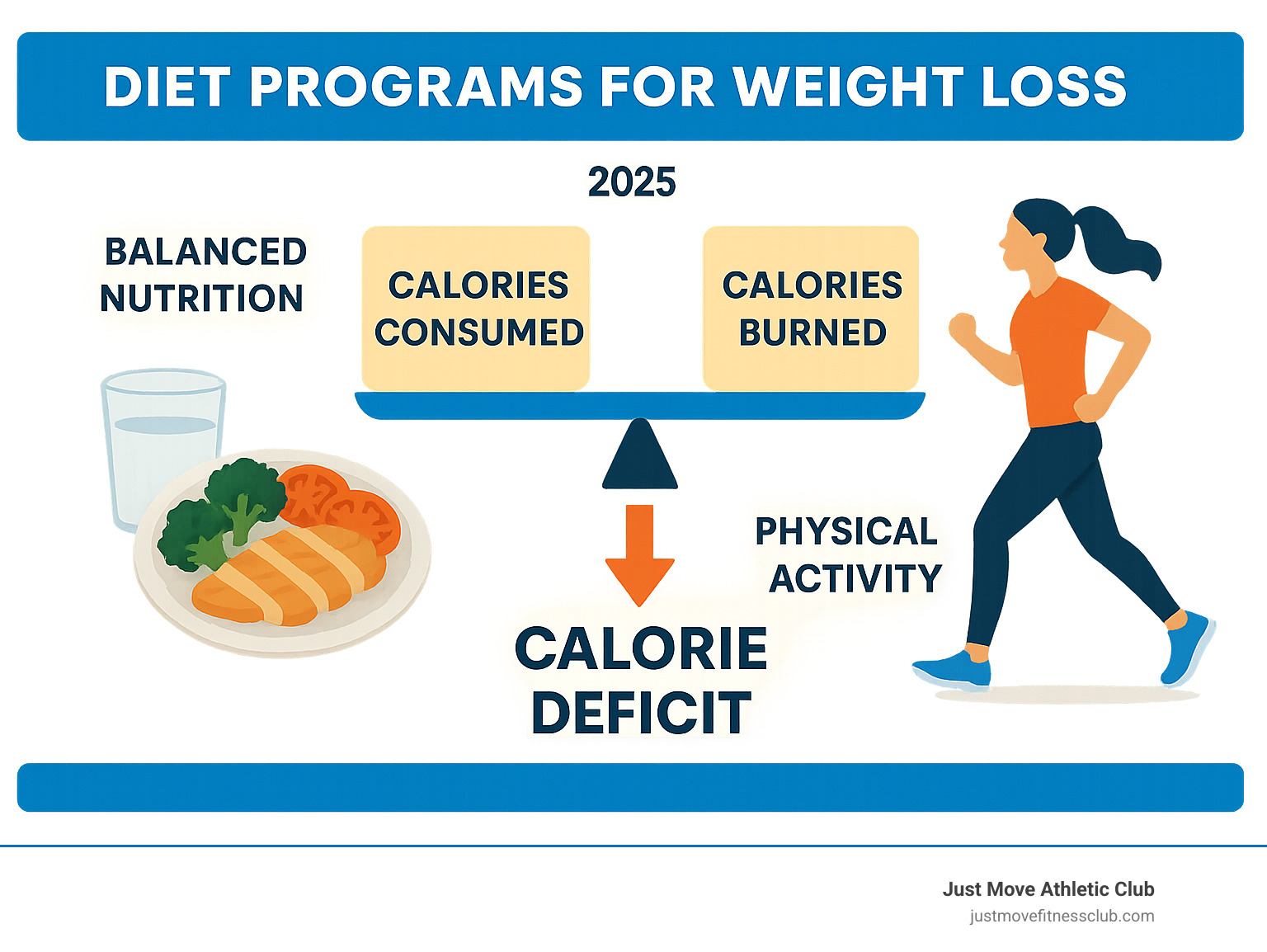Why Understanding Diet Programs for Weight Loss Matters
Diet programs for weight loss come in countless varieties, each promising to be the magic solution to your weight struggles. With nearly 3 in 4 U.S. adults having overweight or obesity, the search for effective weight loss solutions has never been more urgent.
Quick Answer: The Most Effective Diet Programs for Weight Loss
- Balanced diets – Focus on whole foods and sustainable habits
- Low-carb programs – Reduce carbohydrates while emphasizing protein and healthy fats
- Plant-based approaches – Emphasize vegetables, fruits, and plant proteins
- Structured programs – Offer guidance, structure, and support
- Time-restricted eating – Limit eating windows rather than specific foods
Key success factors: Realistic goals (0.5-2 pounds per week), balanced nutrition, physical activity, and long-term sustainability.
The overwhelming array of options can leave you feeling confused. Should you try a low-carb plan? What about intermittent fasting? Is that new program on social media legitimate?
This guide cuts through the noise to help you understand what actually works. We’ll explore different types of programs, red flags to avoid, and how to choose an approach that fits your lifestyle and goals.
As Pleasant Lewis, I’ve spent over four decades in the fitness industry helping thousands of members steer their health journeys. Through my experience with diet programs for weight loss, I’ve seen what works long-term and what leads to frustration and failure.

Understanding the Landscape: Types of Weight Loss Diets
Choosing the right diet programs for weight loss can feel overwhelming. The good news is that most successful approaches fall into two main categories: lifestyle-based eating patterns and structured programs with built-in support.
Each approach has its own philosophy about what to eat and when. Let’s break down the common types so you can make sense of it all.

Common Healthy Eating Approaches
Many people find success by shifting toward healthier eating patterns rather than following strict, temporary diets. These lifestyle approaches focus on whole foods and habits you can stick with long-term.
Low-carb styles significantly reduce carbohydrate intake while increasing protein and healthy fats. Research shows that low-carb diets can boost weight loss, but careful planning is needed to ensure you get all essential nutrients.
Low-fat options take the opposite approach, emphasizing lean proteins and complex carbohydrates while cutting back on dietary fats. These diets can work well, especially when you focus on high-quality carbs rather than processed foods.
Plant-forward meals put vegetables, fruits, legumes, nuts, and whole grains at the center of your plate, with limited or no animal products. Studies show that plant-based diets can be very effective for weight loss and may improve blood sugar, cholesterol, and inflammation.
Balanced eating patterns offer a middle-ground approach that many find sustainable. These plans emphasize fruits, vegetables, whole grains, healthy fats like olive oil, and lean proteins. They are often praised for their long-term sustainability and health benefits beyond weight loss. For example, some plans originally designed to lower blood pressure are also effective for weight management by emphasizing whole foods while limiting sodium and added sugars. Research shows these balanced approaches can reduce blood pressure, cholesterol, and lead to significant reductions in body weight.
For more detailed information, you can explore Scientific research on balanced diets and health benefits.
Time-restricted eating and intermittent fasting focus on when you eat rather than what you eat. This involves limiting your daily eating window or alternating between eating and fasting periods. Both can lead to weight loss by naturally reducing overall calorie intake, but they should be approached carefully, ideally with professional guidance.
Structured & Guided Programs
If you thrive on structure and external support, commercial or medically supervised plans might be a good fit.
Calorie-controlled plans take the guesswork out of portion sizes by providing specific meal plans or point systems. They teach you to estimate portion sizes rather than obsessively counting every calorie.
Meal planning services can simplify healthy eating by providing dietitian-designed weight-loss meal plans that are sometimes customized for specific health conditions or dietary preferences.
Supportive group environments recognize that weight loss is easier with community support. Programs use various systems—from points-based tracking to online communities and in-person meetings—to keep you motivated and accountable.
App-based tracking and coaching brings professional guidance to your smartphone, offering everything from meal logging to personalized coaching.
For individuals with significant health concerns, medically supervised programs might be necessary. These can include very low-calorie diets that use meal replacements and require strict medical supervision due to potential health risks.
Evaluating Diet Program Effectiveness and Safety
Choosing among the many diet programs for weight loss requires evaluating their effectiveness and, most importantly, their safety. While most people can lose weight on almost any diet that restricts calories in the short term, the real challenge is long-term sustainability and whether the program supports overall health.
| Feature | Balanced Eating | Low-Carb Eating | Plant-Forward Eating |
|---|---|---|---|
| Primary Foods | Fruits, veggies, whole grains, lean protein, healthy fats, moderate dairy | Meats, fish, eggs, healthy fats, non-starchy vegetables, low-carb fruits | Fruits, veggies, legumes, nuts, seeds, whole grains, plant-based proteins |
| Potential Benefits | Heart health, blood pressure control, diabetes prevention, sustainable weight loss | Rapid initial weight loss, improved blood sugar control, increased satiety | Weight loss, improved cholesterol, reduced inflammation, heart health, gut health |
| Considerations | Requires mindful portion control, may be slower weight loss | Can be restrictive, potential for nutrient deficiencies, initial side effects | Requires careful planning for nutrient intake (B12, iron), social challenges |
Setting Realistic Weight Loss Goals
Before starting any diet program for weight loss, it’s crucial to set realistic expectations. Rapid weight loss, while tempting, often isn’t sustainable and can have health risks.
Experts suggest aiming for a steady pace of about 0.5 to 2 pounds (0.2 to 0.9 kilograms) a week. A common goal is losing 5% to 10% of your starting weight within six months.
Why this gentle pace? Losing more than 2 pounds a week is considered rapid weight loss and can mean you’re losing muscle and water, not just fat. Your body may also slow your metabolism in response, making it harder to lose more weight and easier to regain it later. Slow and steady truly wins the race.
Health Benefits and Risks of Dieting
When you achieve weight loss through a healthy, balanced diet, the health benefits are huge. This includes a reduced risk of long-term conditions like high blood pressure, heart disease, and type 2 diabetes. It can also make existing conditions easier to manage. For example, shedding extra pounds can help in managing high blood pressure. If you’re curious to learn more, you can find comprehensive Information on managing high blood pressure.
However, not all diet programs for weight loss are created equal. Highly restrictive diets can lead to side effects like fatigue, constipation, or nutrient deficiencies. There’s also “metabolic adaptation,” where your body slows its calorie burning to conserve energy, making it tougher to lose weight and easier to regain it once you stop the diet.
Diet Modifications for Health Conditions
If you have any existing health conditions—like diabetes, heart disease, or food allergies—it is critical to talk with your healthcare provider before starting any new diet program for weight loss. What works for one person could be harmful to another.
For example, changing your diet can significantly affect blood sugar levels if you have diabetes, possibly requiring medication adjustments. Similarly, if you have high blood pressure, a doctor or registered dietitian can help you pick a plan that supports your health. Your health team is your best resource for tailoring a program that’s safe and right for your unique needs.
How to Choose the Right Plan: A Practical Guide to Safe Diet Programs for Weight Loss
Choosing the right diet programs for weight loss isn’t about finding the “best” diet, but the best diet for you. Think of it like shopping for a car—what works for your neighbor might be wrong for your lifestyle, budget, and needs.

The key is finding a program that fits your daily routine and personal preferences. Do you thrive with structure, or do you prefer flexibility? Answering these questions will help you narrow down the options.
Key Features of a Reputable Program
When evaluating diet programs for weight loss, look for these positive signs:
- Realistic Promises: A good program won’t claim you’ll lose 20 pounds in two weeks. It emphasizes that healthy weight loss is gradual, about 0.5 to 2 pounds per week.
- Balanced Nutrition: The plan should encourage eating from all major food groups to ensure you get the nutrients your body needs.
- Focus on Whole Foods: Long-term success comes from learning to make healthy choices with real food, not relying on special products.
- Physical Activity Integration: Exercise is crucial for preserving muscle and supporting overall health. Reputable programs encourage regular physical activity.
- Behavioral Skills: The best programs help you understand why you eat, not just what you eat, teaching skills to manage stress eating and social situations.
- Professional Support: Guidance from registered dietitians, doctors, or certified health professionals adds credibility and safety.
- Maintenance Plan: A solid program includes a plan for keeping weight off long-term, which often requires different strategies than losing it.
Red Flags: Warning Signs of Fad Diet Programs for Weight Loss
Learning to spot these red flags can save you time, money, and frustration:
- Promises of Quick Fixes: Claims like “lose 10 pounds in one week” are unrealistic and potentially dangerous.
- Elimination of Food Groups: Cutting out entire food groups without a medical reason is a sign of an unsustainable fad diet.
- Required Special Products: Programs that require expensive supplements or special foods are often more focused on profit than your health.
- “No Exercise Needed” Claims: Physical activity is essential for health and long-term weight management. Any program suggesting otherwise is incomplete.
- Unrealistic Photos: Be wary of before-and-after photos that seem too good to be true; they are often misleading.
- Lack of Scientific Support: If a program’s claims aren’t backed by credible research, proceed with caution. You can report false claims to the Federal Trade Commission.
Understanding the Costs of Diet Programs for Weight Loss
The financial investment in diet programs for weight loss varies. Many free resources and healthy eating plans are just as effective as paid programs. For subscription-based programs, consider whether the features—like community support or coaching—justify the cost. Be cautious about plans that require you to buy special foods or supplements, as these costs can add up. Always ask about hidden fees and think about the long-term value. A program that teaches you lifelong healthy habits is a worthwhile investment.
Beyond the Plate: The Holistic Approach to Sustainable Weight Loss

For lasting results, we need to look at the whole picture, not just what’s on your plate. A holistic approach that considers your entire lifestyle is key to sustainable weight loss.
The Crucial Role of Physical Activity
While we talk a lot about diet programs for weight loss, exercise is a powerful partner in the process. It’s about more than just burning calories.
Movement helps create the calorie deficit needed for weight loss, but more importantly, strength training helps you build muscle and boost your metabolism. Muscle tissue burns more calories than fat, even at rest, turning your body into a more efficient machine. Beyond weight management, regular physical activity improves heart health, strengthens bones, reduces stress, and lifts your mood. Experts suggest at least 150 minutes or more per week of moderate-intensity aerobic activity. The secret is to find enjoyable activities that you’ll stick with.
Mental Well-being and Professional Guidance
Your mindset plays a huge role in your weight loss journey. Taking care of your mental well-being is just as important as planning your meals.
Stress management is vital, as chronic stress can disrupt hormones and lead to weight gain. Healthy coping mechanisms like meditation or hobbies can make a big difference. Mindful eating—paying attention to hunger signals and savoring your food—helps prevent overeating and builds a healthier relationship with food.
Don’t forget sleep quality. Aim for 7-9 hours of quality sleep each night, as poor sleep can throw off appetite-regulating hormones. It’s also important to identify emotional eating triggers and find healthier ways to cope with feelings.
A strong support system of family, friends, or a structured group provides motivation and accountability. Sometimes, professional guidance is what you need. A registered dietitian can offer a personalized nutrition plan, while a personal trainer can create a safe and effective exercise routine. Their expertise can be invaluable. In fact, research shows that structured approaches can significantly help with weight loss. You can learn more here: Research on meal planning and weight loss.
Frequently Asked Questions about Diet Programs
We hear a lot of questions about diet programs for weight loss. Here are clear, straightforward answers to the most common ones.
How much weight can I realistically expect to lose?
Forget the ads promising dramatic results overnight. A safe and sustainable rate of weight loss is typically 0.5 to 2 pounds per week.
Experts recommend an initial goal of losing 5% to 10% of your starting body weight over six months. This might not sound like much, but it represents real, lasting change that your body can maintain. Rapid weight loss often involves losing water and muscle, not just fat. It can also slow your metabolism, making it harder to keep the weight off. Slow and steady truly wins the race.
Do I need to cut out entire food groups to lose weight?
No, most experts agree that a balanced diet including all major food groups is the most sustainable and healthy approach. Cutting out entire food groups can lead to nutrient deficiencies and feelings of deprivation, making the diet hard to stick with long-term.
Instead of eliminating foods, focus on choosing healthier options within each group: whole grains over refined ones, healthy fats like avocados over trans fats, and lean proteins. The key is sustainability—an eating pattern you can follow for life, not just for a few weeks.
What’s more important for weight loss: diet or exercise?
While both are crucial for overall health, diet generally has a greater impact on weight loss. It’s much easier to create a calorie deficit by adjusting what you eat than by trying to burn off excess calories through exercise alone. You simply can’t out-exercise a poor diet.
However, exercise is absolutely essential for keeping the weight off and for your overall health. It increases your calorie deficit, builds metabolism-boosting muscle, improves heart health, and is a key factor in long-term weight maintenance.
For the best results, we always recommend combining a healthy diet with regular physical activity. At Just Move Athletic Club, we focus on both sides of the equation, helping you build sustainable habits that support your overall wellness journey.
Conclusion
Finding the right diet programs for weight loss doesn’t have to feel like searching for a needle in a haystack. After exploring all the options, research, and red flags, here’s what really matters: the best program is the one you can stick with long-term.
We’ve learned that sustainable weight loss isn’t about finding the perfect diet or the latest trend. It’s about creating a personalized approach that fits seamlessly into your life. Whether that’s a Mediterranean-style eating pattern, a structured commercial program, or a plant-forward approach, success comes down to consistency, balance, and patience.
Diet programs for weight loss are just one piece of the puzzle. The most effective approach combines thoughtful nutrition with regular physical activity, stress management, and a strong support system. It’s about building healthy habits that become second nature, not following rigid rules that make you miserable.
The journey doesn’t end when you reach your goal weight, either. Long-term success requires a maintenance mindset and the tools to adapt when life throws you curveballs. That’s why working with professionals who understand your unique needs can make all the difference.
At Just Move Athletic Club, we’ve seen countless members transform their lives by taking a holistic approach to health. Our custom fitness experiences help you find what types of movement you actually enjoy, while our Fit3D Pro Body Scanner gives you a complete picture of your progress beyond just the number on the scale.
We believe fitness should improve your life, not consume it. That’s why we focus on helping you build sustainable habits that work with your schedule, preferences, and goals. Whether you’re just starting your weight loss journey or looking to maintain your results, we’re here to support you every step of the way.
Ready to stop the diet cycle and start building lasting health? Start your personalized fitness journey with us today and find how good it feels to move your body in ways that actually work for you.
